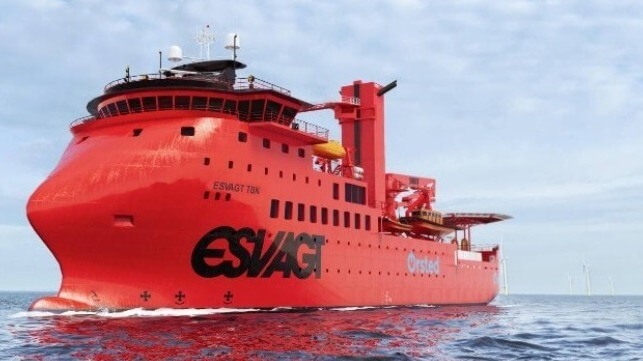Vestdavit Lifts the Bar in Boat Handling Systems with Heavy-Duty Davit

Danish shipowner Esvagt made waves earlier this year when it announced the order at Turkey’s Cemre Shipyard of the world’s first SOV to operate on green fuels under a joint newbuild project with compatriot offshore wind operator Ørsted.
Powered by batteries and dual-fuel engines, the 93-metre long vessel will be capable of sailing on renewable e-methanol produced from wind energy and biogenic carbon, leading to a significant annual reduction of CO2 emissions. The SOV is lined up to work at Hornsea 2 - the world’s largest offshore wind farm - off the UK’s east coast after scheduled delivery in late 2024.
Decarbonisation role
Vestdavit is now participating in this ground-breaking project to decarbonise offshore wind operations after being selected by Esvagt to provide a total of five davit systems for the vessel - two large FF-30000 dual-point workboat davits featuring a unique solution for flexible hook distance, as well as a pair of L-3500 liferaft davits and one PLRH-5000 davit for fast rescue craft.
The FF-30000 system, with heavyweight lifting capacity of 25,000 kilograms, has been specially adapted from an existing Vestdavit design to handle Esvagt’s newly in-house developed Safe Transfer Boat 15 (STB15), a workboat that is longer, wider and heavier than existing such craft used in the offshore wind sector.
The STB15 has a length of 15 metres, versus the industry standard of 12 metres, and is intended to provide a more stable and comfortable working platform for technicians servicing wind turbines, thus giving operational benefits.
Boat-handling challenges
“But the greater dimensions and weight of this workboat pose handling challenges for existing davits to ensure that personnel and equipment can be deployed safely and reliably under variable sea conditions,” says Vestdavit’s Sales and Business Development Director, Bjørnar Dahle.
“Therefore, Vestdavit was required by the client to devise a more suitable technical solution based on the basic design and shape of an existing davit, while working within the structural and practical constraints of the ship design, which meant clearing several obstacles to find a workable concept.”
The solution was to adapt the so-called F-frame (FF) system that comprises a large frame with no structure behind or underneath the daughter craft, which allows for greater flexibility in the shape and volume of the boat being handled, with the main structure aft/forward of the boat.
Flexible hook distance
In addition, the FF-30000 has two lifting points for dual-point lifting of the daughter craft with a dual-winch system consisting of two winches each with autonomous tension function so they can operate independently of each other.
“This dual-point lifting functionality permits a wider weather window as the vessel can still launch and recover daughter craft even in rough sea conditions,” Dahle explains.
But he says probably the smartest and most impressive feature of the system is the flexible hook distance function whereby the aft lifting wire can be adjusted forward to cater for smaller boats with a narrower hook distance.
Flexible innovation
This enables the system also to operate as a single-point davit from the aft lifting point to bring onboard the smaller and more available STB12 workboat as a temporary replacement for the STB15 if the latter needs to be serviced.

that matters most
Get the latest maritime news delivered to your inbox daily.
“This project serves as a good example of how Vestdavit is able to develop an innovative technical solution customised according to the client’s specific requirements by taking a flexible approach in adapting its versatile davit technology,” Dahle says.
“Esvagt is a long-established client for which Vestdavit has previously delivered tailored davit solutions for a number of projects that have proven reliable in operations, building trust that we are able to find the right solution for such first-off projects that will work efficiently in practice.”
The products and services herein described in this press release are not endorsed by The Maritime Executive.
